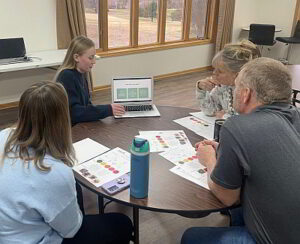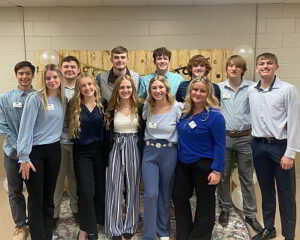Dickinson County CEO Gives High School Students Real-Life Learning Experiences, Business Knowledge
A unique program is helping to cultivate and support the next generation of business owners and leaders in one North Central Kansas county. Dickinson County CEO (Creating Entrepreneurial Opportunities) is an intensive year-long course. It pairs high school students with entrepreneur mentors to give them real-world experience in starting a business.

Students presented their business concepts to Dickinson County CEO Board Members to share their visions and receive feedback. (Courtesy Photo)
The idea for the program came after Kyle Becker, a native of Abilene, Kansas, learned about it from a local entrepreneur. At the time, Becker served on the Board of Education of USD 435. He and others researched and talked to the local schools and the Economic Development Corporation to see if there was interest in starting the first chapter of the program in the state. Dickinson County CEO has now completed four years of the program.

The Dickinson County CEO 2023-2024 class hosted a Rural Roots Live Music Event in Abilene on January 6, 2024. (Courtesy Photo)
While it is not a school program, the course follows the school calendars, and students get credit for the class. The program meets five days a week for 90 minutes before school starts. It never meets in a school but moves to different host sites in various communities and businesses. The distance can create challenges with logistics and time management for students as significant travel time is involved. There are five school districts represented throughout the Dickinson County CEO program.
“It’s a big commitment for the students but very worthwhile,” Becker says. “We do an exit interview with kids at the end of the program. It has been really encouraging to hear the mind shift of some of our students who can recognize the local opportunities that exist after they have been immersed in the program and the communities.”
Partnerships are essential for program success—including local buy-in from businesses and schools, investors, mentors, students, and a program facilitator. The program needed 35 investors to pledge $1,000 annually for three years before it could launch. Fundraising efforts are continual. Many supporters are repeat investors who see the value. Some of these same investors also serve as mentors, a role that is key to student success.
“Mentoring helps the students start to build a network of people they can use in the future as they transition into adulthood, and most of these relationships continue after the class ends,” Becker says.
Prospective students apply in the spring. There were 12 students in the 2023-2024 class. Throughout the year, the students complete three businesses. The first is a badge business that teaches basic business concepts. The class decides as a group on the second business. The precedent so far each year has been a special event such as a 5K race or an evening of entertainment. The most recent class hosted a Rural Roots Live Music Event. Proceeds earned from the first two businesses fund the third, which is each student’s business. Students create a business plan, go through a loan process, operate their own business, and present at a trade show.
“They learn a lot about themselves and life in this class,” Becker says. “They come in as kids that are shy. Their soft skills are not good. By the end of the year, they are confident young adults.”
